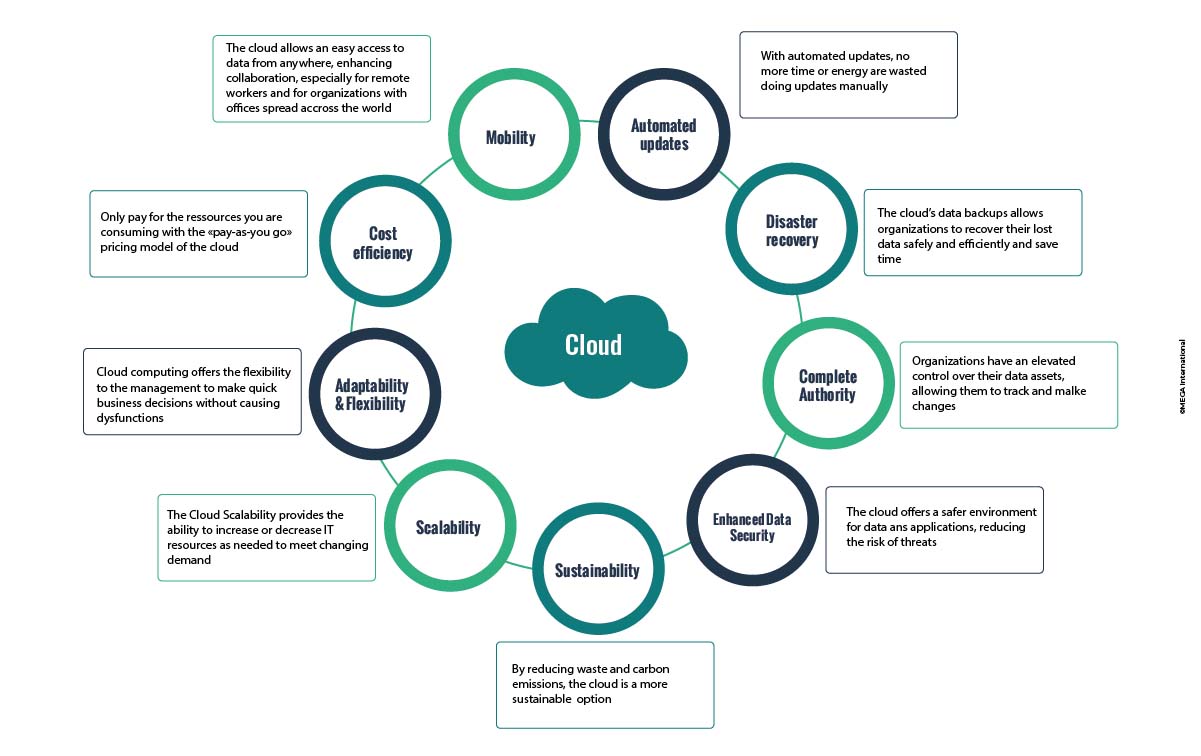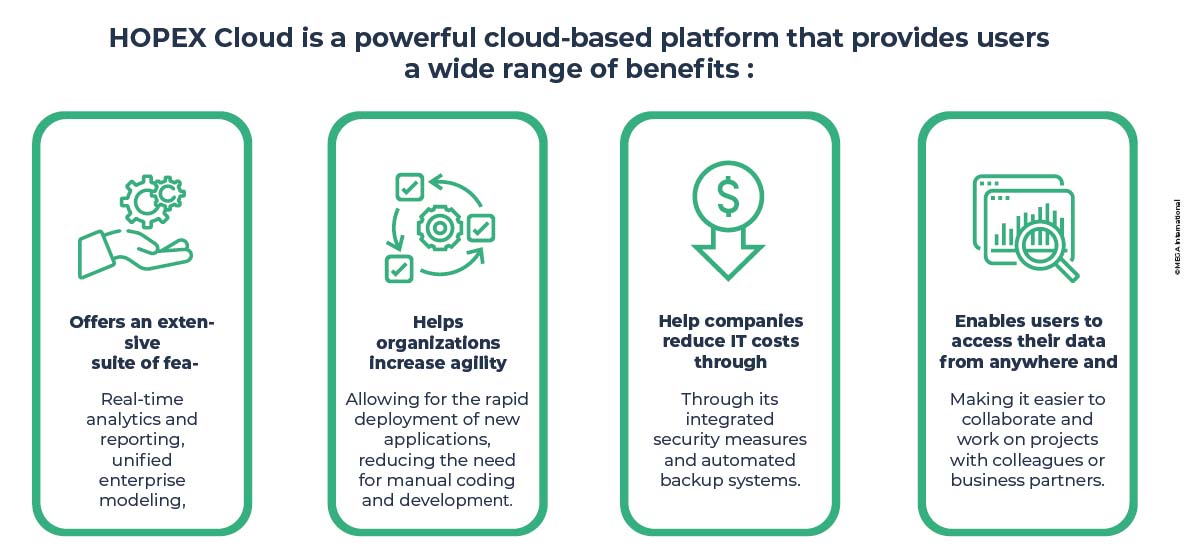
Migrate & Enjoy the Benefits of Cloud Computing
In this article, we will explore the benefits of moving to the Cloud and provide a list of those advantages. Whether you're just learning about the Cloud's potential or considering moving, this article will help you understand all it offers.
Cloud-based technology is becoming an increasingly popular choice for businesses worldwide. The Cloud can help businesses streamline their processes and operations, allowing them to focus more on their core business.
Why is cloud migration important?
- The past 2+ years have seen a massive shift to the Cloud as companies adopted remote or hybrid work environments (many of which are now permanent) and sought to develop more agile operating capabilities.
- Today, nearly two-thirds (72%) of IT decision-makers say their organizations default to the cloud when adopting new technologies, and 69% say they've accelerated their cloud migration plans over the past 12 months.
- Gartner Research estimates that 45% of IT spending in 2024 will go toward cloud-based solutions. These investments support technological and organizational changes to enable and continuously improve digital business models contingent on cloud infrastructures.
- Behind this trend are multiple market drivers, but since last year, the COVID-19 pandemic has proven that cloud-hosted services can deliver resilient, scalable, and reusable IT environments. 2020 was the year that enterprises invested more funds in cloud infrastructure services than in on-premises data centers and hardware, a victory for cloud proponents borne of years of enterprise acceptance and evidence of its value.
- What is less well known to the enterprise audience are the requirements for implementing and governance decentralized IT environments. Prospectively, on-premises applications that can be migrated to the cloud may come with heavy technical collateral. The slightest change in their functional composition can disrupt interconnected business processes and formal compliance-related procedures. Inevitably, trade-offs must eventually be made when migrating these services. If a transition is not tied to a concrete business objective, decisions will be delayed, if taken at all.
Explore the Benefits of Cloud Migration
Cloud computing is revolutionizing how companies do business, and the benefits of moving to the cloud are becoming increasingly apparent. Whether you're a small business or a large corporation, this modern technology has plenty of advantages worth considering. Cloud computing is cost-effective, offering increased flexibility, scalability, and improved team collaboration.
 Learn the best strategy for successful cloud migration here↗
Learn the best strategy for successful cloud migration here↗
If you haven't moved your applications to the cloud yet, check out the many benefits of moving and adopting a SaaS solution below:
Most significant benefits of moving to the Cloud:
Tailored & cost-effective software solutions
Cloud service resources offer cost-effective solutions, as businesses only pay for their services. They can reduce costs when demand decreases without worrying about wasted hardware investments.
Moving from the capital-heavy expense of installing, maintaining, and upgrading on-premises IT infrastructure to the operational cost of a SaaS subscription provides greater clarity on the costs of using a software solution (license, maintenance, and infrastructure costs).
Indeed, the historical complaint about enterprise software has been the unknown cost to deploy, operate, and archive. With SaaS, the total cost of managing the application is fixed and transparent from the start, so there aren't any surprises or unexpected costs; in other words, it is a pay-as-you-go model.
Scalability
Cloud resources can provide businesses the flexibility to adjust to changing needs. With cloud resources, companies can quickly scale up or down depending on their current requirements.
This is especially beneficial for businesses that have unpredictable peaks and troughs in their demand, as they don't have to invest heavily in infrastructure that becomes redundant during quieter periods.
In summary, cloud computing provides a highly scalable solution for businesses looking for greater flexibility and cost savings per their changing business needs.
Flexibility Remote work
With cloud adoption, you only need an internet connection to work on your daily tasks and projects the same way as desktop applications. Your work is automatically saved and safely stored in the cloud.
You can also easily collaborate with your peers using modern embedded features such as review notes and validation workflows, improving teamwork efficiency and providing faster results. This enables your workforce to work remotely without productivity taking a hit.
Automated backups and disaster recovery
Cloud solutions generally include automated backups that are out of the box. Cloud vendors can perform daily backups and weekly and monthly backups so that you are sure that your data is safe.
In addition to backups, cloud vendors can offer advanced disaster recovery programs to protect you from unexpected disruption. Production data are synchronized regularly to a secure server in a remote location. In the event of a disaster, the production server is updated with the latest backup of the remote server.
Up-to-date software
Cloud systems provide higher uptime than on-premises systems. Cloud systems help reduce technology complexity and rely on an enhanced and secure cloud infrastructure.
With SaaS, there’s also no need to plan for costly IT upgrades. It eliminates the hassle of managing upgrades or any other IT expansion as your business grows. By letting the software vendor manage upgrades, it ensures that your software solution is always up-to-date.
Enhanced Data security
Last but not least, cloud solutions are even more secure than on-premise solutions, enabling you to store your strategic data on a secure infrastructure. Cloud providers are large companies with high technical expertise and hire certified professionals.
They comply with many international regulations and use the most recent technologies. Cloud providers also run powerful cybersecurity software to prevent attacks and protect your data.
Furthermore, cloud resources offer increased security as data is stored securely off-premise, keeping it safe from any potential damage caused by natural disasters or malicious attacks.
Types of Cloud
When it comes to cloud computing, there are different types of clouds available to choose from, each with advantages and disadvantages. Cloud storage offers incredible convenience when accessing files from any device with an internet connection, making it a valuable tool for businesses and individuals.
There are four types of clouds: private clouds, public clouds, hybrid clouds, and multi-clouds. The main two types are public and private cloud storage. Public cloud storage is open to anyone with an account, allowing users to store and access data from any device connected to the internet.
Private cloud storage offers more secure options for those needing extra data security, as it requires unique authentication before allowing access. Users can select the best choice for their needs with both public and private options.
HOPEX Cloud Benefits
HOPEX Cloud offers excellent tools for businesses to streamline operations, accelerate growth, and optimize their IT infrastructure. HOPEX Cloud is a powerful cloud-based platform that provides users a wide range of benefits.

The platform enables users to access their data anywhere and anytime, making it easier to collaborate with colleagues or business partners on projects.
It also offers an extensive suite of features such as real-time analytics and reporting, unified enterprise modeling, process orchestration, and more. Additionally, HOPEX Cloud helps organizations increase agility by allowing for the rapid deployment of new applications, reducing the need for manual coding and development. Finally, the platform can help companies reduce IT costs through its integrated security measures and automated backup systems.
At MEGA, we provide a flexible cloud offering that relies on the Microsoft Azure infrastructure, available in two configurations, depending on your needs:
- HOPEX Cloud Essentials is based on a multi-tenant architecture. It offers an affordable, full-featured cloud infrastructure built for ease of use and performance.
- HOPEX Cloud Enterprise uses a single-tenant architecture. It is best suited for custom configurations and advanced security needs. It has completed the SOC 2 Type 2 examination based on the trust principles of security, availability, and confidentiality. With HOPEX Cloud Enterprise, you can configure multiple settings, including security access options, SSO, and advanced disaster recovery. Additional management services, such as sandboxes and extended services, are available upon request.
Want to learn more about our HOPEX Cloud program? Please download our HOPEX Cloud datasheet.
In conclusion, migrating to the Cloud offers many business advantages. From cost savings and improved scalability to enhanced security and higher performance, cloud computing solutions are undoubtedly the way of the future.
The time to move is now, and the benefits are too great to ignore. Furthermore, with various options from various providers, companies can find the perfect solution for their unique needs. Make the switch today and experience all that cloud computing has to offer!
FAQs
Moving to the cloud is worth it, as it can save businesses money, time, and resources. It can also improve a business's efficiency and scalability, allowing it to focus on its core operations.
Cloud computing offers several benefits to businesses and individuals alike. The three primary benefits of cloud computing include cost savings, scalability, and reliability.
The cloud has become increasingly popular and is now used by many businesses and individuals. There are three common reasons to use the cloud - cost savings, scalability, and flexibility.


